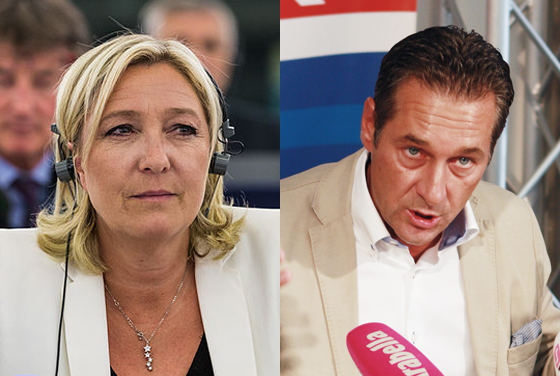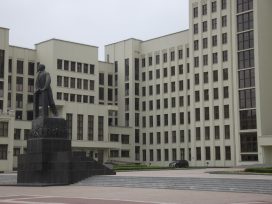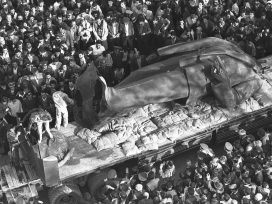While Moscow’s support of the Front National appears to be waning in advance of the French presidential elections, its ties with Austria’s far right have been cemented by a unique agreement. What does this say about Russian strategy in western Europe?
In December 2016, two major stories on relations between Russia and the European far right were reported by the media. One concerned the visit of the leadership of the Freedom Party of Austria (FPÖ) to Moscow and the signing of a cooperation agreement with United Russia, the party of Vladimir Putin – a move that sparked discussion about the FPÖ’s foreign policy. The other story concerned problems that started to affect the Front National (FN) in 2016 in connection with the infamous €9 million loan it obtained from a Russian bank in 2014.
What are the similarities and differences between the FPÖ and FN in their cooperation with various Russian actors? While both parties have a history of expressing pro-Russian sentiments, their trajectories have differed somewhat.

Marine Le Pen, European Parliament in Strasbourg, 1 July 2014. Photo: Claude Truong-Ngoc. Source: Wikimedia.
Heinz-Christian Strache during a press conference, 17 August 2012. Photo: Emil Goldberg. Source: Wikimedia.
Front National
The FN embraced a pro-Russian foreign policy immediately after the demise of the Soviet Union. Jean-Marie Le Pen, then party leader, travelled to Moscow several times during the 1990s and 2000s, frequently at the invitation of Vladimir Zhirinovsky, the leader of the far right, misleadingly named Liberal-Democratic Party of Russia. One FN member also took part in the First World Congress of Patriotic Parties, an international far right forum organised by Zhirinovsky in January 2003 in Moscow that hosted a few dozen representatives of far right and pro-Russian organisations from Europe, Asia and Africa. In the 2000s, however, Le Pen stopped going to Russia as often as he had done in the 1990s, because his only Russian partners were ultranationalists whose chances of coming to power were slim. All his attempts to meet top-ranking Russian politicians – in 2002 Le Pen even expressed a desire to meet with Putin – eventually failed.
From 2008–2009 onwards, a number of French far-right activists loosely associated with FN established several small pro-Moscow organisations such as France-Russia Collective (Collectif France Russie), Equality and Reconciliation (Egalité et Réconciliation) and Association France-Europe-Russia Alliance (Association Alliance France-Europe-Russie). These organised various pro-Kremlin events which, however, were too marginal to be of interest to the Russian authorities.
It was not until 2012–2013 that relations between the French far right and Russian officials assumed a qualitatively new level. Marine Le Pen replaced her father Jean-Marie as the leader of the FN in 2011 and almost immediately expressed her desire to visit Moscow and meet high-ranking politicians or officials. Moscow was cautious of relations with the FN, because of the forthcoming presidential elections in France in 2012. In 2011, when Le Pen made her pro-Moscow position clear, it was François Hollande and Nicolas Sarkozy, rather than Le Pen, who were the most popular presidential candidates. The Kremlin did not want to compromise its future relations with the French president and therefore did not invite Le Pen to meet with any high-ranking Russian officials.
The situation began to change after the election of Hollande, who met Putin in Paris and criticised the latter for his support of the murderous regime of Bashar al-Assad. After that, Moscow seemed to abandon hope of good relations with Hollande and decided to establish links with the FN. In 2012–2013, prominent FN members, including Marine Le Pen’s niece Marion Maréchal-Le Pen, Bruno Gollnisch, Aymeric Chauprade and Le Pen herself, visited Moscow several times and met a number of officials and politicians close to United Russia. Eventually, the FN obtained a €9 million loan from the First Czech–Russian Bank, owned by companies and holdings that belonged to Gennadii Timchenko, a major Russian businessman from Putin’s inner circle. This connection suggests that Putin himself could have been directly involved in making the final decision to provide the loan to the FN.
FPÖ
The FPÖ took a pro-Kremlin stance in 2008, after the Russian invasion of Georgia in August. From autumn onwards, high-ranking FPÖ members, together with the Russian journalist and ultra-nationalist Maksim Shevchenko, organized several conferences in Vienna; these were of an anti-Georgian, anti-American, and pro-Putin character. Shevchenko collaborated with the FPÖ for several years and brought representatives of the Russian Civic Chamber, members of the ruling United Russia party, the Russian fascist Aleksandr Dugin, and his associates Mikhail Khazin and the now deceased Geidar Dzhemal, to Vienna between 2008 and 2010. Shevchenko also helped to organize the visit of two prominent FPÖ members, Johann Gudenus and Johannes Hübner, to Chechnya to meet Ramzan Kadyrov.
On other visits to Russia, FPÖ leaders met with the mayor of Moscow, Yuri Luzhkov, the governor of the Moscow oblast, Boris Gromov, members of United Russia and others. On each of these visits, FPÖ leaders discussed the possibility of establishing business relations with Russia, but to date there is nothing that would attest to the success of their negotiations. Back in Austria, the FPÖ established ties with Rossotrudnichestvo (the Russian agency responsible for civilian foreign aid), the Russian embassy in Austria, the Society of Austrian-Russian Friendship, and the Vienna-based “Russian Ball”.
Like the FN, it was the FPÖ itself that initiated this pro-Kremlin shift in its international activity. Originally, there was no “Russian influence” – just the high-ranking FPÖ member Johann Gudenus, who speaks Russian, who once had a Russian girlfriend, and who possibly had or has economic ties to Russia. But it must be said that the Kremlin, despite all the FPÖ’s pro-Russian activities, almost never considered the Austrian right-wing radicals as their main allies in Austria. Official Moscow had other allies: the conservative Austrian People’s Party (ÖVP) and the Social Democratic Party of Austria (SPÖ) – mainstream political forces that have close ties to Austrian largest businesses and industries. The FPÖ does not have such ties, and thus Moscow did not want to spoil relations with their mainstream Austrian partners (to whom Moscow is tied by major business interests) by giving any significant support to the right-wing radicals who oppose the social democrats and conservatives.
The Kremlin’s strategy
Relations over the past several years between official Moscow, on the one hand, and the FN and FPÖ, on the other, suggest that the Kremlin’s approach is guided by a distinction between what might be called Plan A and Plan B. For the Kremlin, Plan A is to work with mainstream western politicians who either support or, at the very least, turn a blind eye to Moscow’s aggressive foreign policy. In Germany, these politicians are called Putin–Versteher – “Putin understanders”. Importantly, Plan A will only work if the Putin–Versteher are in power or very close to getting into power. If the Putin–Versteher in a particular western country become too few or have too little authority, then Moscow opts for Plan B. This is to support anti-systemic, especially far right, political forces to subvert the liberal-democratic order.
Moscow’s unwillingness to cooperate with the FN in 2011 can be explained by the Kremlin’s anticipation that Plan A would work with Hollande after he became president in 2012. After Hollande turned out to be critical of Russia’s foreign policy, Moscow activated Plan B and started supporting the FN. In Austria, Plan A was in place until 2016 because of the strong position of the SPÖ/ÖVP coalition. However recent developments seem to indicate that, in the Austrian case, the Kremlin is shifting from Plan A to Plan B.
What exactly has changed, and why is it important?
The FPÖ’s presidential nominee Norbert Hofer won the first round of the 2016 Austrian presidential elections. Representatives of the SPÖ and ÖVP did not even make it into the run-off – for the first time in Austria’s post-war history. The FPÖ now tops the opinion polls and the party has a chance of winning more than 30 per cent of votes in the 2018 parliamentary elections. For Moscow, this means that the FPÖ, with its openly pro-Kremlin positions, has a good chance of coming to power. To be sure, the FPÖ would not be able to form a government on its own, but would need at least one coalition partner – either the SPÖ or ÖVP. Each of these parties has its advocates of a coalition with the FPÖ. Although there are also many opponents, the chances of the FPÖ coming to power in coalition with the ÖVP, for example, are quite high, particularly with the support of the latter’s Russian business partners.
The Kremlin cannot let such an opportunity slip, and so it took an unprecedented step: on 28 November 2016, the leadership of United Russia decided to sign a cooperation agreement with the FPÖ. It is unclear who proposed this. One hypothesis is that United Russia simply resolved to agree to what the FPÖ had proposed to do long ago. One interesting detail: the decision was made less than a week before the second re-run of the presidential elections on 4 December. The Kremlin was clearly preparing to congratulate Hofer on his victory at the signing of the agreement in Moscow on 19 December. Hofer lost, however, and the celebration was more muted.
Moscow’s mid-term strategy will not change, however: the 2018 Austrian parliamentary elections remain the primary objective. The agreement with the FPÖ opens up more possibilities. In particular, it provides for “the development of economic, trade and investment cooperation between the two countries”, which could potentially help the FPÖ during its electoral campaign. So far, not a single far-right party in Europe has such an agreement, at least publicly. This appears to make it much more important in terms of connections between the European far-right and Putin’s Russia than the €9 million Russian loan to the FN in 2014.
In the case of the FN, the Kremlin seems to be changing its course from Plan B back to Plan A. In 2016, the Republicans, the French centre-right party, held primaries to select a candidate for the 2017 French presidential election. In these primaries, which took place in November 2016, François Fillon defeated Alain Juppé. Fillon is known for his Moscow-friendly positions, while Juppé is sceptical about Russia’s domestic and international activities.
Various public opinion polls conducted in November-December 2016 – prior to the corruption scandal that hit Fillon in January 2017 – showed that Fillon would have a slight advantage over Le Pen in the first round of the 2017 presidential election but would win by a landslide in a second round run-off against Le Pen. Moscow seems to consider both Fillon and Le Pen to be “pro-Russian” candidates, but since Fillon – according to polls at that time – would likely win, the Kremlin’s continuous support for Le Pen in the run-up to the presidential elections could compromise potentially good relations with Fillon, were he to be elected. Therefore, the FN is unlikely to obtain any substantial funding from Russia. According to the FN itself, the party needs €27 million for the 2017 presidential and parliamentary electoral campaigns.
Moreover, the Russian state-controlled Deposit Insurance Agency that deals with the contracts previously managed by the First Czech-Russian Bank, which was declared bankrupt in 2016, declared in December 2016 that it was trying to recover the €9 million loan to the FN through the courts . It is highly improbable that the Deposit Insurance Agency’s decision to take legal steps was made without the Kremlin’s approval. This decision looks like a message to Fillon that Moscow is no longer supporting his stiffest competitor in the presidential elections.
Published 6 February 2017
Original in English
First published by Eurozine
In collaboration with
In focal points
Newsletter
Subscribe to know what’s worth thinking about.








